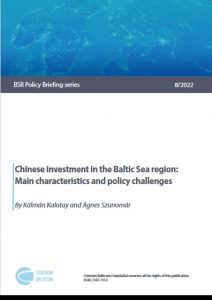Chinese investment in the Baltic Sea region:
Main characteristics and policy challenges
By Kálmán Kalotay and Ágnes Szunomár
23.06.2022 – Centrum Balticum
Abstract
This report analyses the dynamics and main features of Chinese investment, especially foreign direct investment (FDI), in the Baltic Sea region, as well as the policy challenges that such investment raises in the early 2020s. It reviews the main demographic, economic, institutional and geopolitical factors shaping Chinese investment in the region. The Chinese approach towards such investment is far from being unified since Chinese firms follow different motives and strategies when entering different countries of the region. As for overall FDI trends in the region as a whole, flows are rather volatile and, though there has been an increase of flows since 2018, China is not (yet) a major source of FDI for the Baltic Sea region,
and these countries, perhaps with the exception of Germany, are not key targets for Chinese investment. As for the importance of China and its investment, Russia has become the country most relying on it. The report also looks at Chinese policies promoting investment to the region and the response of the countries in the Baltic Sea region both in terms of attracting and screening such FDI. The report notes the
increasingly close strategic investment ties of Russia with China, which have been further strengthened since the onset of the war in Ukraine.
Key words: China, Baltic Sea region, foreign direct investment, Belt and Road Initiative, greenfield investment, mergers and acquisitions, global value chains, and investment policy.
Download full text: BSR Policy Briefing 8_2022 (pdf) (1.3 MB)


